BEAM electronics, as it is known, has become quite popular. One of the central ideas is to drive small autonomous robots with solar cells, powered by ambient light.
Sunceram II
Since 1983 Panasonic has been manufacturing solar cells from the Sunceram II series. These cells were very popular for amateur electronic projects until about 2003 when the production of these cells apparently stopped.
The datasheet of the Sunceram II solar cells explicitly mentions that you should not lick these cells. This is understandable since the cells consist of a fragile glass plate covered with layers of sintered cadmium telluride and cadmium sulfide.
The Sunceram II solar cells consist of monolithic series connected cells. Panasonic chose to designate the cells by their physical dimensions in millimeters. Among the popular cells were the ones from the following table which I happen to have in my collection. The BP-242221, BP-243318 and BP-373334 were all originally designed for outdoor use under full sun illumination, which is supported by their behavior in the solar simulator.
| BP-242221 | BP-243318 | BP-373334 | |
|---|---|---|---|
| size | 24×22 mm2 | 24×33 mm2 | 37×33 mm2 |
| thickness | 1.2 mm | 0.8 mm | 0.8 mm |
| no of cells | 6 | 5 | 8 |
| cell area | 0.6 cm2 | 1.2 cm2 | 1.2 cm2 |
| weight | 1.7 g | 1.6 g | 2.4 g |
| Voc(1) | V | 3.9 V | 5.9 V |
| Isc(1) | mA | 13.6 mA | 12.9 mA |
| FF(1) | % | 53 % | 56 % |
Amorton
Sanyo has been making solar cell modules of a similar size to the Sunceram series above for quite a while now. Similar to the Sunceram modules also the Amorton modules consist of a glass plate, but here the active layer is made of amorphous silicon. Amorton modules come in two different configurations: one for indoor use at low ambient light levels and one for outdoor use at full sun illumination.
The AM-1602 from my collection is an indoor module — the datasheet explicitly limits the use of these modules to illuminations of below 1000 lux. The measurement curves show the poor behavior of these modules under higher levels of illumination from 200 W/m2 to 1200 W/m2, caused by the high series resistance. However, at low light levels these modules work quite well.
Solarbotics
With the disappearance of the Sunceram II series of solar cells a need for an alternative source came up. The Canadian company Solarbotics created a series of small solar cell modules of similar (or better) performance to the Sunceram II series. These modules consist of small stripes of single crystalline silicon solar cells, mounted on a printed circuit board and encapsulated with clear epoxy resin.
The Solarbotics module SCC2433 for example is more or less meant to be a direct drop-in replacement for the Sunceram BP-243318 module. Compare the measurement curves and you will see that the Solarbotics modules are significantly better: a higher fill factor, higher voltage, higher current and less series resistance. However, this comes at the cost of about twice the weight as compared to the Sunceram II modules.
The Solarbotics modules are equipped with a printed circuit board on the backside, ready to build a capacitor-charging solar engine. In the inside the small solar cell stripes are series-connected at one edge and the solder joints are clearly visible. Originally the SCC3766 was planned to allow for two module configurations: two half-modules which can be connected in series for a high voltage or in parallel for a high current output by means of solder joints on the pcb. Currently this functionality is not provided by the actual modules since all individual cells are fixed in a series connection.
| SCC2422 | SCC2433 | SCC3733 | SCC3766 | |
|---|---|---|---|---|
| size | 24×22 mm2 | 24×33 mm2 | 37×33 mm2 | 37×66 mm2 |
| thickness | 2.6 mm | 2.6 mm | 2.6 mm | 2.6 mm |
| no of cells | 7 | 8 | 12 | 14 |
| cell area | 0.5 cm2 | 0.6 cm2 | 0.6 cm2 | 1.4 cm2 |
| weight | 1.6 g | 2.7 g | 4.3 g | 8.5 g |
| Voc(1) | 4.1 V | 4.7 V | 7.1 V | 8.4 V |
| Isc(1) | 16.9 mA | 20.7 mA | 21.9 mA | 43.3 mA |
| FF(1) | 76 % | 74 % | 74 % | 76 % |
Conrad
The German electronics distributor Conrad sells compact silicon modules of a similar type as the Solarbotics modules. The difference is the lack of the solar engine on the back of the printed circuit board. Another cosmetic difference is made by hiding the solder joints under a strip of black tape inside the epoxy package.| YH-39×35 | |
|---|---|
| size | 39×35 mm2 |
| thickness | 3 mm |
| no of cells | 8 |
| cell area | 0.9 cm2 |
| weight | 4.8 g |
| Voc(1) | 4.7 V |
| Isc(1) | 34 mA |
| FF(1) | 71 % |
(1) measured under standard test conditions of 1000 W/m2, 25 °C and AM 1.5




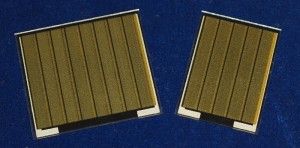
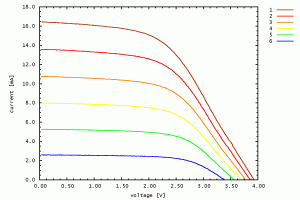
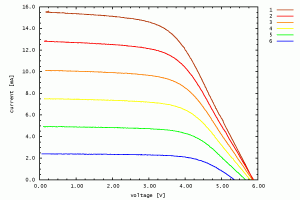
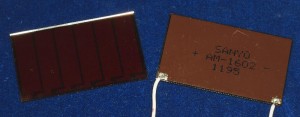
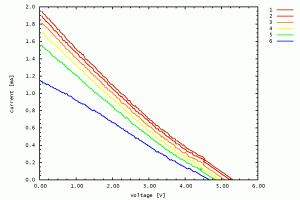
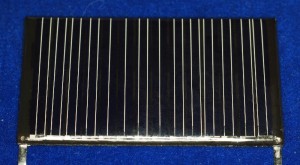
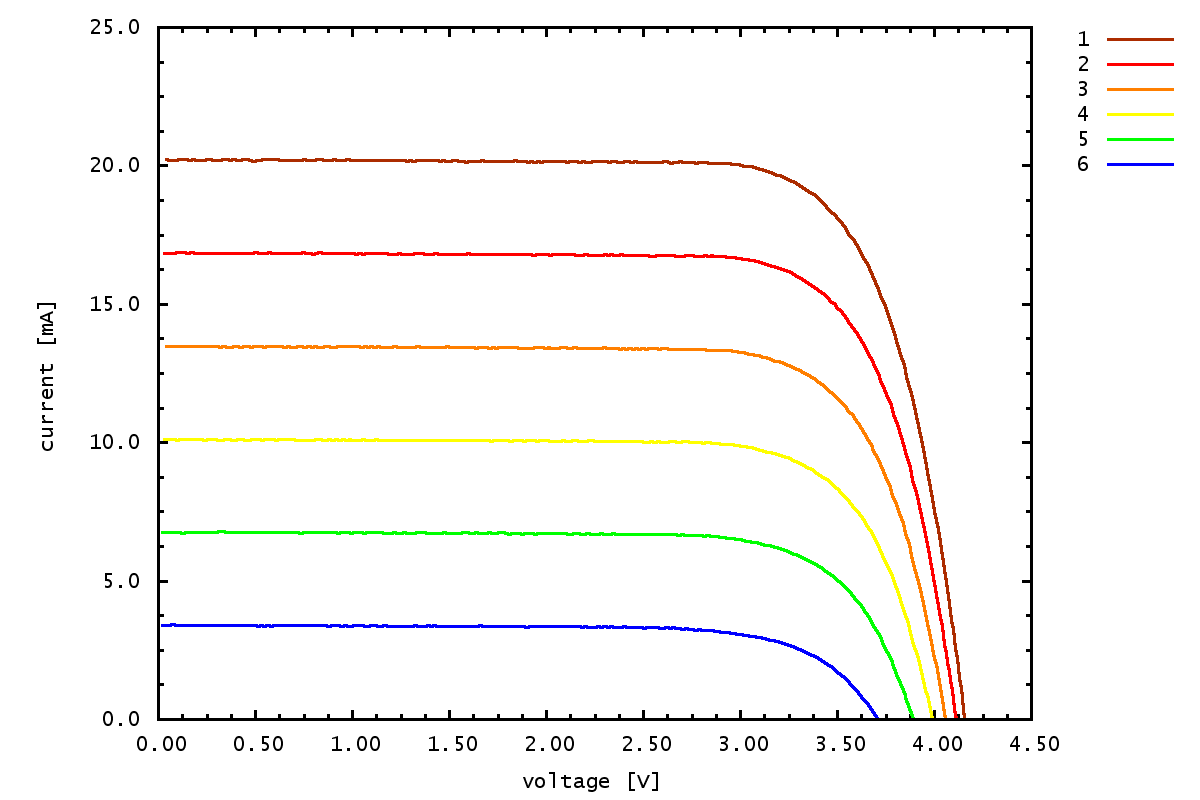
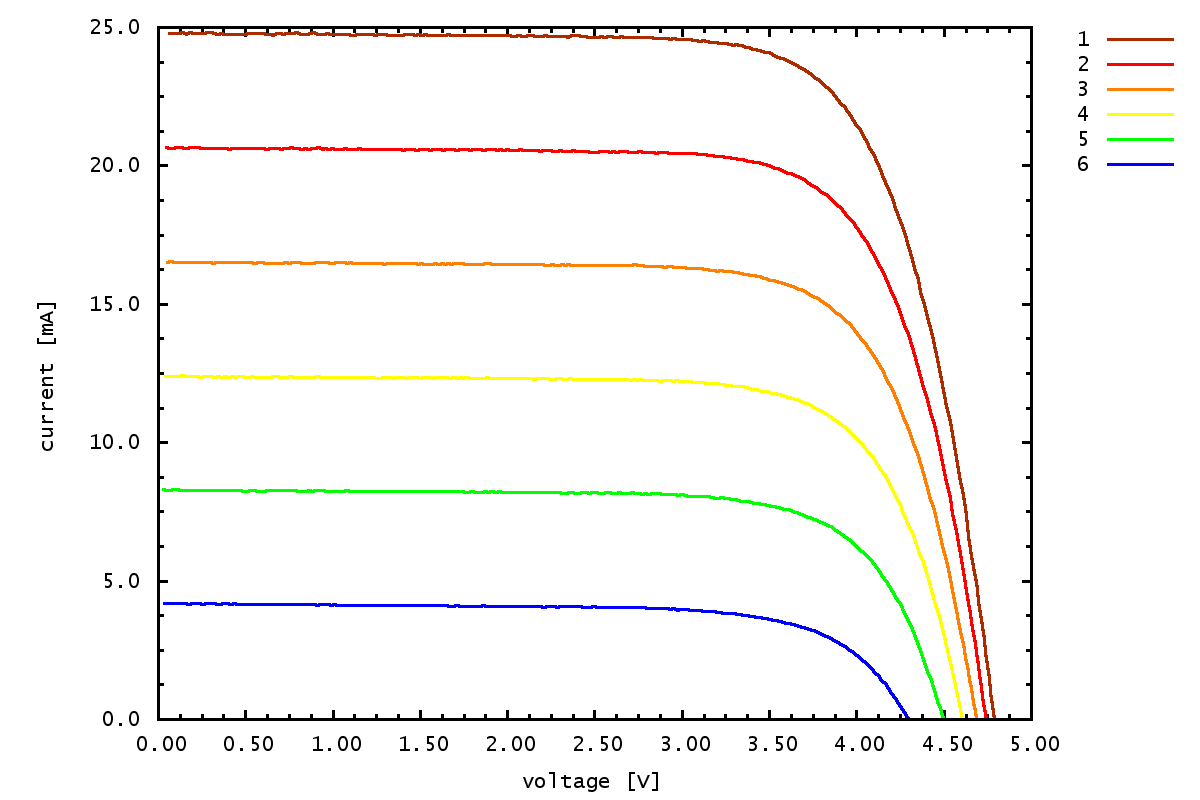

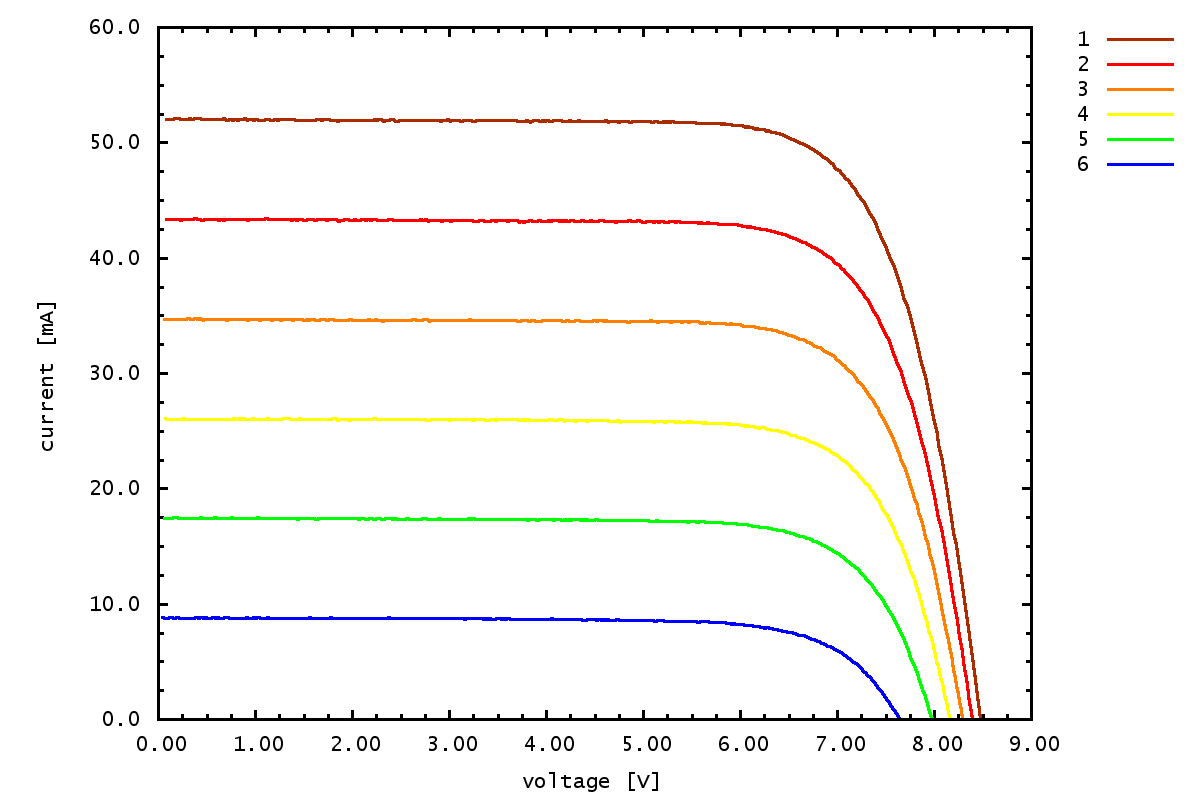
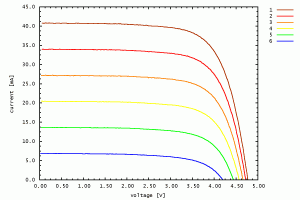
Best info I have found on cells.
Now it is 2016…What are the new low ambient (indoor)light
solar cells that are small for hobby use?
It would be great if this blog could be updated.
Hi there!
Small solar cell modules of amorphous silicon, which can be found on most solar garden lights, are still the best choice. Chinese eBay-sellers selling small assemblies of pieces of crystalline silicon on a circuit board are efficient for outdoor use, but not always suitable for low light levels, but generally have the same characteristics as the Solarbotics-modules above..
Ein sehr interessantes Thema. Leider bin ich selbst in solchen Dingen nicht begabt genug, um mir selbst Solarzeller zu konstruieren und quasi selbst angebauten Strom aus der Steckdose.de nutzen zu können.
Der Strom aus den Solarzellen auf dieser Seite würde auch nicht genügen, um den Haushalt zu versorgen. Es handelt sich um Solarzellen für elektronische Hobbyprojekte und Basteleien…
Hmm it seems like your blog ate my first comment (it was extremely long) …
Get yourself an automated SPAM blocker, than “comments” like yours get blocked instantly…
[…] … I encourage everyone to visit this site and read this article […]
With all the white snow we have had as lately I am stuck inside , as luck would have it there is the cyberspace, thanks for giving me something to do
Oh dear it appears like your blog ate our initial comment it was rather lengthy) so I imagine We’ll just summarize the things i submitted plus point out, I really enjoying your blog. We as well am a driven website writer but I’m still a new comer to the whole thing. Do you possess any tips and hints for rookie bloggers? I truly certainly enjoy it.
Hi! I’ve been following the site for a long time finally acquired the bravery to go ahead and provide you with a hello out via Lubbock Texas Simply wanted to mention continue this excellent work. Furthermore did you hear, about the Dalai Lama’s nephew was killed in US accident?
It is a good information. A great blog. Thank you!